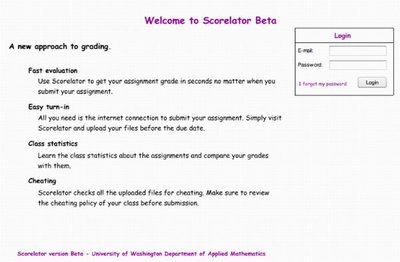December 4, 2008
Scorelator: New virtual TA grades programming homework in seconds
Nathan Kutz, UW applied mathematics professor, felt particularly daunted when he realized that more than 200 students had enrolled in his fall quarter course, Beginning Scientific Computing. It would take at least five teaching assistants just to wade through the grading alone, he said.
So Kutz created a program to do the grading for him, freeing his time and his TAs’ time for actual teaching. The application, Scorelator, is now available for beta testing in UW classes with programming-based homework.
“There’s been a huge increase in computationally based courses in the last five to 10 years, both at UW and at other universities and community colleges,” Kutz said. Programming classes used to be concentrated in computer science departments, Kutz said. But now, many math and science departments at UW and other institutions offer basic computational courses with programming-based assignments.
And someone has to grade those assignments, no small feat when each assignment could contain 100 or more lines of code. Now multiply that by five assignments and 200 students, and add in large variations in how each student will code a given problem — that’s a lot of time spent grading. Kutz has been using Scorelator in his beginning computing class this fall, and was pleased to find how much extra time he and his three TAs now have to actually teach and help students, he said.
Scorelator grades assignments nearly instantly. Students upload their program files, and Scorelator returns their current score and identifies those portions of the assignment that need correcting. Instructors can set the number of times students are allowed to revise their assignments before the submission is final. The application will then show students their grades and the grade distribution of the class. It could also be used as a supplementary grader, or just a checker if instructors prefer to do their own grading, Kutz said.
“It’s extremely simple to use,” Kutz said. “The student sees two buttons: ‘Upload file’ and ‘View grade.'” Students and instructors will log on to www.scorelator.com.
Right now, Scorelator can grade codes written in MATLAB, Mathematica, Maple and Python languages. The majority of computing courses across engineering, math and physical sciences use these languages, Kutz said, but they may expand Scorelator in the future to accommodate other languages as well.
Kutz has been using the program for the past two years in his applied mathematics courses, and has been very happy with the results, he said. He is offering Scorelator for free use at UW and a few other universities for the next term in exchange for the teachers and students filling out satisfaction surveys at the end of the course. In the next year or two, he hopes to make it commercially available to all universities and colleges.
“There’s really nothing like Scorelator out there yet,” Kutz said. “This could be quite transformative.”
Faculty or instructors interested in beta testing Scorelator in one of their classes can attend an information session and demo from 2 to 4 p.m. Tuesday, Dec. 16, in 415L Guggenheim, or email Kutz at kutz@amath.washington.edu.



